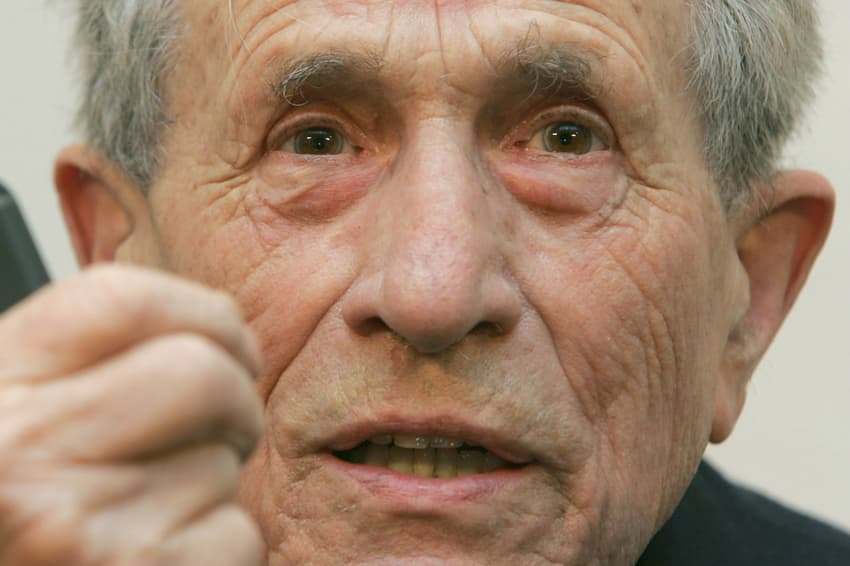Nazi camp cash counterfeiter Adolf Burger dies at 99

Adolf Burger, the last of the concentration camp inmates forced by Nazi Germany to churn out phoney British money, has died at the age of 99, media reports said Thursday.
Burger wrote a book about his astounding experience, which was turned into the film "The Counterfeiters" that went on to win the Oscar for best foreign film in 2008.
Czech public radio reported that he died on Tuesday, citing information from his daughter. Burger had lived in Prague since the end of World War II.
He was a Jewish activist from Slovakia who spent two years working in the ultra secret counterfeiting operation, one of the largest in history, in the Sachsenhausen concentration camp north of Berlin.
The 139 printers and forgers would succeed in replicating the pound and the dollar before the end of the war, and would produce 131 million pounds in false notes as part of a scheme by the bankrupt German state to flood the British economy with fake cash.
Drawn from Burger's book, "The Devil's Workshop", the film poses questions of morality and survival as the counterfeiters, housed in separate barracks, enjoy small luxuries amid the death and squalor of the camp.
His counterfeiting skills led to Burger's initial arrest in Bratislava on August 11, 1942, when the professional printer was detained for making false baptism certificates aimed at saving Slovakia's Jews, already earmarked for destruction by Jozef Tiso's clerical-fascist regime.
Sent first to Auschwitz and then moved to Birkenau, Burger said he weighed only about 35 kilogrammes when the Germans decided to exploit his skills and sent him to the Sachsenhausen camp in Germany.
Burger fled during the general confusion caused by the Allied advance during the last days of the war.
On his arrival in Prague in 1945, Burger recounted the story of the biggest economic sabotage attempt in history to local police, with its impact soon becoming apparent.
"They (the police) called a bank and they brought over a suitcase of notes considered to be authentic. As we, the typographers, knew what no one else did, I was able to recognise the false notes we had produced. There were around 200 of them," he recalled.
Comments
See Also
Burger wrote a book about his astounding experience, which was turned into the film "The Counterfeiters" that went on to win the Oscar for best foreign film in 2008.
Czech public radio reported that he died on Tuesday, citing information from his daughter. Burger had lived in Prague since the end of World War II.
He was a Jewish activist from Slovakia who spent two years working in the ultra secret counterfeiting operation, one of the largest in history, in the Sachsenhausen concentration camp north of Berlin.
The 139 printers and forgers would succeed in replicating the pound and the dollar before the end of the war, and would produce 131 million pounds in false notes as part of a scheme by the bankrupt German state to flood the British economy with fake cash.
Drawn from Burger's book, "The Devil's Workshop", the film poses questions of morality and survival as the counterfeiters, housed in separate barracks, enjoy small luxuries amid the death and squalor of the camp.
His counterfeiting skills led to Burger's initial arrest in Bratislava on August 11, 1942, when the professional printer was detained for making false baptism certificates aimed at saving Slovakia's Jews, already earmarked for destruction by Jozef Tiso's clerical-fascist regime.
Sent first to Auschwitz and then moved to Birkenau, Burger said he weighed only about 35 kilogrammes when the Germans decided to exploit his skills and sent him to the Sachsenhausen camp in Germany.
Burger fled during the general confusion caused by the Allied advance during the last days of the war.
On his arrival in Prague in 1945, Burger recounted the story of the biggest economic sabotage attempt in history to local police, with its impact soon becoming apparent.
"They (the police) called a bank and they brought over a suitcase of notes considered to be authentic. As we, the typographers, knew what no one else did, I was able to recognise the false notes we had produced. There were around 200 of them," he recalled.
Join the conversation in our comments section below. Share your own views and experience and if you have a question or suggestion for our journalists then email us at [email protected].
Please keep comments civil, constructive and on topic – and make sure to read our terms of use before getting involved.
Please log in here to leave a comment.